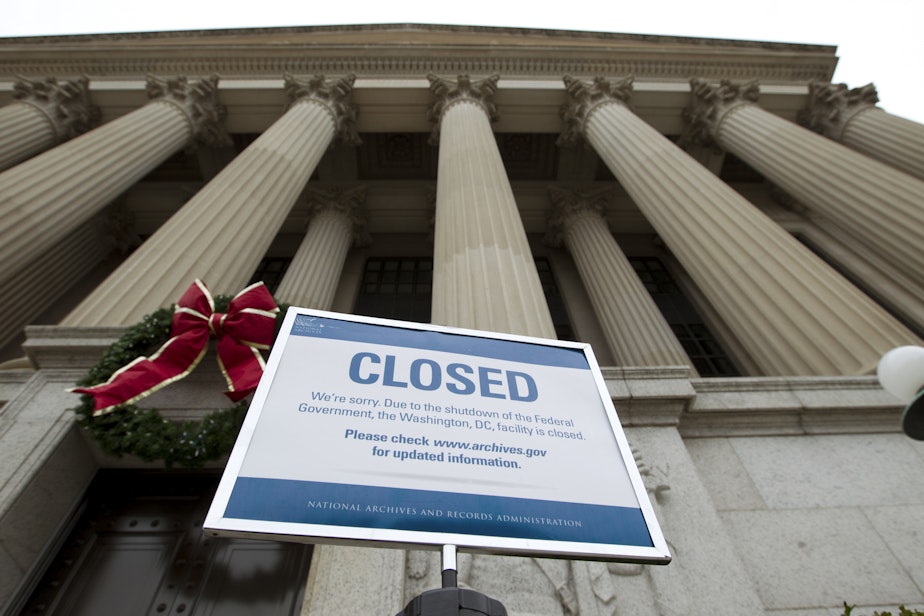Where The Government Shutdown Is Hitting Americans The Hardest

With Meghna Chakrabarti
The government shutdown drags on. We’ll examine if there’s a deal on the horizon, and check in with real people affected by the shutdown.
Guests
Julie Burr, administrative assistant with the Department of Transportation in Kansas City, Missouri. She’s a contract worker employed by a third party, not a direct federal employee, which means she likely won’t receive any back pay. (@juliedotburr)
Lisa Desjardins, correspondent for the PBS Newshour. (@LisaDNews)
Sponsored
Aaron Payment, tribal chair of the Sault Ste. Marie Tribe of Chippewa Indians.
Heidi Burakiewicz, lead attorney in a lawsuit filed by the American Federation of Government Employees (@AFGENational). The lawsuit alleges the partial government shutdown is illegally forcing hundreds of thousands of “essential” or “excepted” employees to work without pay.
From The Reading List
PBS NewsHour: “5 reasons why this shutdown is worse for federal workers” — “Politicians have argued that the current government shutdown is less disruptive than past shutdowns because just nine of 15 cabinet agencies — and approximately 15 percent of federal civilian workers — have been affected.
“But this still leaves some 800,000 federal workers unsure of when they will get another paycheck, and an unknown number of federal contractors, who work for private companies but are paid to complete specific projects by the government, with no pay and without any indication it will ever be made up.
Sponsored
“The PBS NewsHour reached out to dozens of those workers and contractors, and many said that for them, this shutdown is actually worse than past shutdowns. Below are quotes from some of the people we interviewed. We verified their identities but in some cases allowed them to remain anonymous, or only identified them by their social media handles, because they fear reprisals at work for speaking with the media.”
New York Times: “Shutdown Leaves Food, Medicine and Pay in Doubt in Indian Country” — “For one tribe of Chippewa Indians in Michigan’s Upper Peninsula, the government shutdown comes with a price tag: about $100,000, every day, of federal money that does not arrive to keep health clinics staffed, food pantry shelves full and employees paid.
“The tribe is using its own funds to cover the shortfalls for now. But if the standoff in Washington continues much longer, that stopgap money will be depleted. Later this month, workers could be furloughed and health services could be pared back. ‘Everything,’ said Aaron Payment, the chairman of the Sault Ste. Marie Tribe, ‘is on the table.’
“For many Americans who are not federal workers or contractors, a shutdown is a minor inconvenience. A trip to a national park may be canceled. A call to a government office may go unanswered. But for Native American tribes, which rely heavily on federal money to operate, a shutdown can cripple their most basic functions.
“All across Indian Country, the federal shutdown slices deep. Generations ago, tribes negotiated treaties with the United States government guaranteeing funds for services like health care and education in exchange for huge swaths of territory.”
Sponsored
The Hill: “Federal workers union sues Trump admin over government shutdown” — “One of the country’s largest unions representing federal workers is suing the Trump administration over the government shutdown, claiming that it is illegal to require employees to work without pay.
“The American Federation of Government Employees (AFGE) union released a statement on Monday announcing its lawsuit as the shutdown stretches past a week.
“The lawsuit, filed in the U.S. Court of Federal Claims, alleges that the federal government is in violation of the law by requiring some federal workers, many of which are represented by the union, to work without pay during the shutdown.”
Washington Post: “Federal workers — in a panic about their pay — apply for unemployment” — “As they get closer to missing their first paycheck of the new year, many federal employees are filing for unemployment benefits to tide them over during the government shutdown.
“Even if a deal is reached quickly to reopen the shuttered agencies, workers probably won’t get a paycheck until mid-January or later.
Sponsored
“So what’s a worker to do?
“In Maryland, the total number of federal employees who filed unemployment claims as of Jan. 2 was 637, according to the state’s Department of Labor, Licensing & Regulation. One of those filers is Zachary Levine, a 63-year-old physicist at the National Institute of Standards and Technology, who is still awaiting approval for his claim.
“In the past, following previous government shutdowns, workers were given back pay. However, Congress isn’t required to do this, so Levine said he filed for unemployment as a strategic move to preserve his savings.” [Copyright 2019 NPR]
